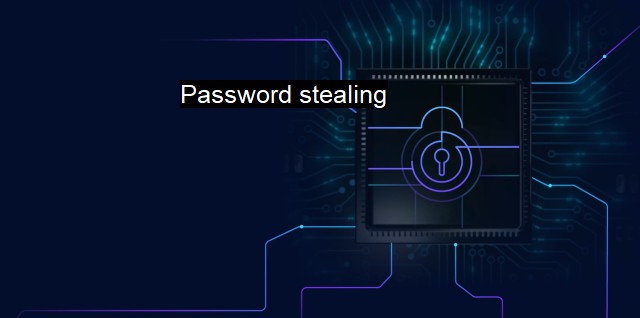What is Password stealing?
Password Stealing and the Importance of Cybersecurity: Protecting Sensitive Data in a Digital World
Password stealing is a form of cyber threat where an online criminal, popularly known as a hacker, gains unauthorised access to a user's password. Using technologically advanced practices, cybercriminals aim to steal these unique pieces of information to gain improper entrance to the victim's private, often sensitive, data. This situation could lead to significant personal, professional, or financial harm for the victim, demonstrating the importance of executing cautious actions when safeguarding user's login details.The realm of password stealing predominantly thrives due to the victims' negligent behaviour. Often, users may reuse passwords across various websites, making it easier for threats to penetrate these systems. Once one account gets compromised, the other accounts with duplicated passwords swiftly fall into jeopardy. the hacker's task simplifies when the user opts for easily guessable password patterns, such as birth dates or names.
The mechanism of password theft may deploy various strategies. One of these is 'Keylogging', wherein the hacker makes use of special software that records the victim's keystrokes. The attacker then retrieves and utilises the information encoded from these keystrokes, which often includes sensitive data such as passwords and bank account details.
Another technique that cybercriminals prefer is 'Phishing'. It is a deceptive tactic where the attacker disguises themselves as a trustworthy entity to lure the user into revealing their passwords. The simulation of banks, breeze to the notorious example. Once the user enters their details, treating the dubious email or website to be genuine, the hacker harvests these details for unlawful purposes.
Considering the well-orchestrated and simple tactics hackers deploy to steal passwords, it emphasises the dire need for cybersecurity software and knowledge about antiviruses. Antivirus software can play an integral role in defending against these password stealing methods. It is competent in detecting and removing malware, thus preventing data leakage to some extent. The software scans computer systems regularly, updating consistently to offer the best protection against the latest cyber threats.
Although sophisticated antivirus tools provide a fair fighting chance against cyber-attacks, user responsibility should not be underscored. Internet users need to incorporate a healthy behavioural pattern around digital platforms to minimise the risk of password theft. It includes choosing solid a password that incorporates a mix of alphanumeric and special characters, making it difficult for hackers to guess. a good practice is to implement two-factor authentication. This feature requests an additional piece of evidence to verify the user's identity, thus adding an extra layer of security.
As password theft presumably mutates into more complex forms, society's dependence on digital spaces remains steady. In this context, programming robust cybersecurity practices and fostering advanced antivirus awareness is crucial. It is equally essential to pursue a thorough understanding of the particular antivirus software in use across different digital platforms.
Password theft is among the most prevalent threats the digital world faces. Given this reality, it is integral for users to consciously choose effective passwords, recognize and evade potential cyber traps, actively educate themselves about the threats, and invest in efficient and reliable antivirus software as a measure of self-defence.

Password stealing FAQs
What is password stealing?
Password stealing refers to the act of stealing login credentials of an individual or organization without their knowledge or consent. Cybercriminals use various techniques such as phishing, keylogging, and social engineering to steal passwords.What are the consequences of password stealing?
Password stealing can lead to various cybersecurity threats such as unauthorized access to sensitive information, financial theft, identity theft, and malware infections. It can also damage the reputation of an individual or organization and cause financial losses.How can I protect myself from password stealing?
To protect yourself from password stealing, you should use strong and unique passwords for all your accounts, enable two-factor authentication, avoid clicking on suspicious links or downloading attachments from unknown sources, keep your antivirus software up-to-date, and avoid sharing your login credentials with anyone.What should I do if I suspect my password has been stolen?
If you suspect your password has been stolen, you should change your password immediately and enable two-factor authentication. You should also scan your device for malware using antivirus software and monitor your financial transactions for any suspicious activities. If necessary, you should contact your bank or credit card company and report the incident to the relevant authorities.| | A | | | B | | | C | | | D | | | E | | | F | | | G | | | H | | | I | | | J | | | K | | | L | | | M | |
| | N | | | O | | | P | | | Q | | | R | | | S | | | T | | | U | | | V | | | W | | | X | | | Y | | | Z | |
| | 1 | | | 2 | | | 3 | | | 4 | | | 7 | | | 8 | | |||||||